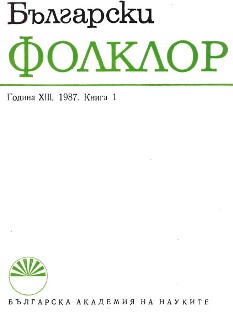Континюитет и промени във фолклорната проза
Continuity and Changes in the Folk Prose
Author(s): Rositsa AngelovaSubject(s): Anthropology
Published by: Институт за етнология и фолклористика с Етнографски музей при БАН
Summary/Abstract: Changes in the life of the ethnos are deeply reflected in its folklore. The processes deriving from them accompany folklore in the entire course of its development, but they are particularly intense and explicit during transition periods from one epoch to another. Folk prose, due to its genre peculiarities, is the most quick and sensitive to react. The changes in the narrative tradition of the Balkan peoples were well manifested already in the twenties of the present century and the stages in their progress since then could be witnessed at first hand. The fundamental transformations in the political and social life in Bulgaria after World War II led to considerable changes in the everyday life and the outlook. These, in their turn, gave rise to processes in the sphere of folk prose turning gradually from sporadic phenomena to regularities. The process of contamination and interaction between genres became more active during the last decades affecting all spheres of folklore. The traditional folk narrative stock was strongly influenced by the growing knowledge of the people about natural and social phenomena, by the new way of thinking and conceiving of the world, the advance in religious and ethical views, the keen interest towards social problems. The latter, together with the changes in the outlook, the more critical attitude to ideas and institutions of the past brought a comic element into genres to which humour was previously uncommon, and made it more intense in those built upon its principles. Parallel to this, another process ran affecting all narrative genres: the process of reducing the role of fantasy and the large penetration of realistic elements into the world of magic. The image of the democratic character became more vivid, its appearance in tales more frequent, and its part more significant. The realistic trend and the preference for folklore in which reality is strongly felt, led to the bloom of stories of all kinds. The stories gained a predominant position over the folktales, taking subject-matters, motifs and characters from the whole narrative tradition. Observations and experiments reveal that a number of changes, some of the most essential ones at that, took place under the influence of the audience. Some tale-tellers instantly complied with the spontaneous interference of listeners, others reflected it at a later stage. All these processes do not destroy the nature or the continuity of the folk prose, neither do they change the spirit of tradition. The new stories, if not variants of the old ones, are built after their pattern. Traditional plots and traditional composition are preserved even in cases of most significant alternations. The new trend is to be found mainly in the details and the modern versions exist parallel to the originals. The general laws in the development of folk narratives are always to be found, due to the parallel action of suspensory actors and dynamic ones. Thus an implementation is achieved..
Journal: Български фолклор
- Issue Year: XIII/1987
- Issue No: 1
- Page Range: 17-25
- Page Count: 9
- Language: Bulgarian
- Content File-PDF

